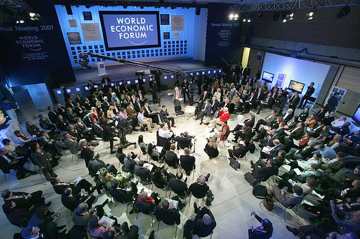
The Corporate Muppets running Davos, the annual gathering of financial and industrial leaders, launched their 2012 meeting saying that now is the moment for business to take over from government as the key force for social change. But the evidence they present for this claim proves quite the opposite: in reality, while trust in politicians and companies has collapsed, public movements like Occupy and Tea Party, plus peer-to-peer web sites are likely to become far more influential.
The impetus for the debate is the just-released poll by Edelman, a corporate PR company, showing that the public’s faith in government has dropped sharply around the world in the past year due to a mixture of corruption and incompetence. It is this change which is causing people to go off-grid in growing numbers, particularly in the US.
In the poll of 5,600 wealthy, well-educated and well-informed respondents in 25 countries, those saying they trusted their government fell from 52 per cent to 43 per cent, with the figure falling below 30 per cent in countries including Japan, Russia and Spain.
The steep falls in politicians’ standing in countries from France to Brazil, previously unseen in the 12-year history of the survey, more than erased the gains governments had made since the onset of the global financial crisis.
Politicians are now even less trusted than business, non-government organisations or the media, and the number of countries where a majority of the “informed public” polled said they distrusted all four institutions almost doubled in the year, from six to 11 per cent.
The causes for waning public faith in governments varied from the eurozone debt crisis to corruption scandals in Brazil and the handling of the aftermath of Japan’s earthquake, said Richard Edelman, the consultancy’s president.
“We see a yawning gap between what people expect of government and the performance they say government is actually delivering,” said Mr Edelman.
At Davos he will say that the new public view – that government officials were the least credible spokespeople – had given companies “a licence to lead”.
However, Dominic Barton, managing director of McKinsey consultancy, noted that business and non-government organisations had also lost ground in the survey. “We’ve got business, government and society in that triangle,” he said. “It’s a pretty torn fabric.”
Trust in business globally fell back from 56 per cent to 53 per cent. Chief executives saw a sharp drop in their standing, with the number saying they saw this group as credible spokespeople falling from 50 to 38 per cent. In every country, however, government leaders were even more distrusted than business leaders.
The US saw a slight rise in companies’ standing – trust levels rose four percentage points to 50 per cent. The figure jumped 10 points to 71 per cent in China, but the opposite was true in western Europe. In Germany, France and Spain, the share of the “informed public” saying they trusted business fell from about half to a third or less.
Executives hoping for less political scrutiny more than three years after Lehman Brothers collapsed will be concerned by the poll’s finding that half of those asked said they wanted business to be more tightly regulated, while only 22 per cent thought companies were over-regulated.
Financial services companies remain the least-trusted businesses, and trust in banks fell further, with distrust in the banking sector spreading from the eurozone to South Korea and Japan. In the US, however, bankers regained some public trust, despite the harsh light shone on them by the Occupy Wall Street movement.
Policing corporate behaviour ranked highest on respondents’ lists of expectations of government, but “those are things business could do itself.”
That presents business with an opportunity to influence debate, Mr Edelman said.
Mr Barton said the survey offered contrasting lessons on the case for collaboration between business and government. “The negative side is that if two groups with negative trust start fighting with each other, that’s like two drowning people fighting,” he said.
The survey shows the stark impact of Japan’s earthquake, tsunami and nuclear crisis. Trust in government halved to only 26 per cent, trust in the energy industry dropped from 75 to 29 per cent and the share of people seeing government officials as credible spokespeople dived from 63 to only 8 per cent.
One Response
Much of the reason why governments do not deliver on what people perceive is required is that they are hogtied by strong business lobbies. They are to all intents and purposes threatened by business until they do what business wants. With notable exceptions, business is all about money and a few fat cats getting richer. International government debates are highjacked by multinationals to the extent that no agreement is reached. Yes, there are corrupt governments and dictators who only think of themselves and their own power, but…….
Ordinary people ARE fighting back, often un-noticed and unsung – read “Blessed Unrest” by Paul Hawken – how the largest movement in the world came into being and nobody saw it coming.